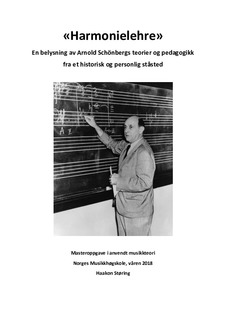| dc.contributor.author | Støring, Haakon | |
| dc.date.accessioned | 2018-10-18T10:33:40Z | |
| dc.date.available | 2018-10-18T10:33:40Z | |
| dc.date.issued | 2018 | |
| dc.identifier.uri | http://hdl.handle.net/11250/2568606 | |
| dc.description | Norges musikkhøgskole. Masteroppgave. Anvendt musikkteori | nb_NO |
| dc.description.abstract | Denne oppgaven belyser Arnold Schönbergs innovative teorier og pedagogikk gjennom hans hovedverk Harmonielehre (1911/1922). Ved gjennomgang av Schönbergs Harmonielehre problematiseres og utforskes flere konsepter med en rekke forskjellige innfallsvinkler. En historisk gjennomgang av harmonilærefaget er slik gjort som et grunnarbeid for sammenligning med Schönbergs teorier. Schönbergs senere publikasjoner vil også bli benyttet for å belyse enkelte problemer. Mine personlige erfaringer fra arbeidet med Schönbergs oppgaver vil også ha en sentral plass i gjennomgangen. Dette har som formål å tilgjengeligjøre dette verket for både historikere, teoretikere, pedagoger og nysgjerrige studenter. Det vil også utforskes hvordan Schönbergs metoder kan videreutvikles for å kunne benyttes i et moderne satslærefag. I denne prosessen er det blitt gjort en kort undersøkelse av den norske sastlæretradisjonens historie. | nb_NO |
| dc.description.abstract | Title in English: “Harmonielehre” Arnold Schoenberg’s pedagogical and theoretical ideas from a personal and historical perspective
This thesis explores Arnold Schoenberg’s innovative theoretical and pedagogical ideas through his most important book Harmonielehre (1911/1922). By working through his Harmonielehre several concepts will be discussed form different points of view. A historical survey of the theoretical subject “Harmony” will be used for comparison with Schoenberg’s ideas. Schoenberg’s later publications will also be used to elucidate certain problems. My personal experience working with Schoenberg’s exercises will also play an important role. The purpose of this task is to make this work more accessible for historians, theoreticians, pedagogues and curious students. The thesis will also explore how Schoenberg’s methods can be developed and applied to a modern course in music theory (satslære). In this process, a brief historical survey of the Norwegian practical music theory tradition has also been carried out. | nb_NO |
| dc.language.iso | nob | nb_NO |
| dc.publisher | Norges musikkhøgskole | nb_NO |
| dc.relation.ispartofseries | Norges musikkhøgskole. Masteroppgave. Anvendt musikkteori;2018 | |
| dc.subject | speculative music theory | nb_NO |
| dc.subject | practical music theory | nb_NO |
| dc.subject | tonality | nb_NO |
| dc.subject | function theory | nb_NO |
| dc.subject | scale degree theory | nb_NO |
| dc.subject | fundamental bass | nb_NO |
| dc.subject | music history | nb_NO |
| dc.subject | pedagogics | nb_NO |
| dc.subject | satslære | nb_NO |
| dc.subject | harmony | nb_NO |
| dc.subject | music theory | nb_NO |
| dc.subject | Theory of harmony | nb_NO |
| dc.subject | Harmonielehre | nb_NO |
| dc.subject | Arnold Schoenberg | nb_NO |
| dc.subject | Arnold Schönberg | nb_NO |
| dc.title | "Harmonielehre". En belysning av Arnold Schönbergs teorier og pedagogikk fra et historisk og personlig ståsted | nb_NO |
| dc.title.alternative | “Harmonielehre” Arnold Schoenberg’s pedagogical and theoretical ideas from a personal and historical perspective | nb_NO |
| dc.type | Master thesis | nb_NO |
| dc.subject.nsi | VDP::Humaniora: 000::Musikkvitenskap: 110::Musikkteori: 112 | nb_NO |
| dc.source.pagenumber | ix, 284 s. | nb_NO |
